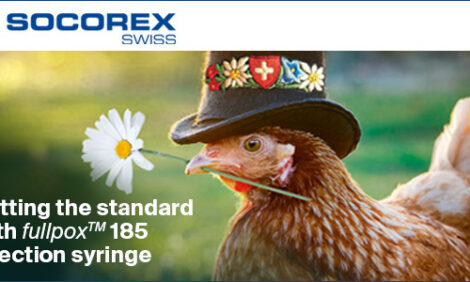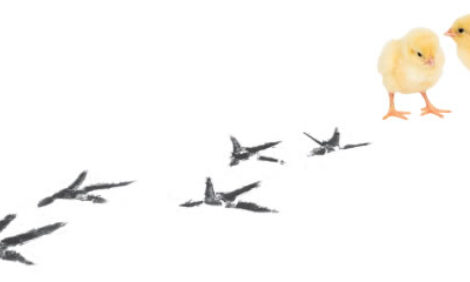



Biosecurity Guidance For Poultry Keepers
By Defra - This document, published by the UK Government provides information on how to achieve a good level of biosecurity for poultry farms. The article covers the benefits of biosecurity, how to keep diseases out of the farm and buying new stock safely.Peace of Mind, A Healthier Flock and a More Viable Business
 All Poultry keepers need to be aware of the need for strict biosecurity and hygiene on their premises.
All Poultry keepers need to be aware of the need for strict biosecurity and hygiene on their premises.
Benefits:
- HELPS KEEP OUT exotic diseases such as Newcastle Disease and Avian Influenza
- REDUCES THE RISK of zoonotic diseases such as salmonella becoming established
- LIMITS SPREAD of diseases and HELPS TO PROTECT your neighbours, public health and the countryside
- IMPROVES overall flock health
- CUTS COSTS of disease treatment
- REDUCES LOSSES and could improve farm profitability
How Disease Spreads:
- Movement of poultry, people, vehicles and equipment between and within farms
- Introduction of birds of low or unknown health status
- Contact with neighbours' flocks
- Using shared farm equipment and vehicles which have not been effectively cleansed and disinfected
- Contact with vermin and wild birds
- Birds drinking from contaminated water sources
- Birds eating contaminated feed
- Unsatisfactory cleaning and disinfection of vehicles, sheds, feeding troughs and other equipment
|
Important!
|
How to Stop Disease – Keep Your Farm Clean!
- Don't bring infection onto your farm, or spread it around your farm, on your clothes, footwear or hands. Clean overalls and footwear must be worn when entering poultry farms. Protective clothing and footwear should be removed and either cleansed and disinfected, laundered or disposed of after use.
- Strictly limit and control access to poultry flocks. If possible the site should be fenced with a controlled entry point. Visitors and their vehicles should be limited and as far as possible kept away from poultry buildings and pastures.
- Have pressure washers, brushes, hoses, water and an approved disinfectant available. Make sure they are used by visitors to clean vehicles, equipment and boots.
- Keep farm access routes, parking areas, yards, areas around buildings and storage areas clean and tidy and well maintained. This helps avoid wild birds and animals being attracted onto the site and entering buildings and stores.
- Wild birds can carry poultry diseases. Minimise contact between poultry and wild birds. Prevent accumulation of standing water and remove spilled feed that could attract wild birds. Maintain buildings to ensure that wild birds do not nest or roost in them.
- Keep wild birds, dogs, cats, rodents or other livestock out of poultry buildings and feed stores.
- Have an active rodent and pest control system in place. Be vigilant for evidence of vermin. Monitor vermin activity by baiting and trapping.
- Supply only clean fresh drinking water to birds. Water lines and drinkers must be flushed through and cleaned regularly. In the case of free-range birds restrict access to possible sources of standing water used by wild birds.
- Feed bins, hoppers and feeding equipment must be cleaned and maintained regularly. Feed silos and containers must be sealed to prevent animals and wild birds contaminating feed.
- Feed should only be obtained from a mill or supplier that operates in accordance with relevant Defra and UKASTA Codes of Practice who will make available results of salmonella tests on request.
- Damaged eggs, dead birds, litter and manure may carry disease. Dispose of them promptly and properly.
- Clean and disinfect all vehicles after each journey. If possible, do not use the same vehicles for transporting birds, feed, manure or other wastes.
- Regularly clean and disinfect all crates, containers and other equipment before and after use. Do not move any equipment into different poultry buildings without cleaning and disinfecting it first. This also applies to injecting and dosing equipment.
- At depopulation at the end of a cycle, thoroughly clean the building and all equipment, including ducting, drains and fans. Remove all surplus feed, dead birds and litter. Disinfect the premises and all equipment and carry out rodent and other pest control. Cleaning equipment and protective clothing should also be cleaned and disinfected.
Buying New Stock - Always know the health status of birds you are buying or moving!
- Incoming stock should be kept properly isolated from the rest of the flock - discuss with your vet and agree a testing and monitoring programme
- Only place new stock in facilities which you know have been cleaned and disinfected
- Use separate equipment and staff or handle isolated stock last. Never reenter your main flock buildings after dealing with isolated stock until you have washed and changed into cleaned overalls and boots
- Keep isolation buildings as near as possible to the farm entrance and as separate from other poultry buildings. Ensure buildings are in good repair and effectively prevent vermin from getting in and spreading any diseases
|
Be Vigilant!
|
To view the full document in PDF format (4 pages, 19Kb) CLICK HERE
Source: DEFRA - July 2003








